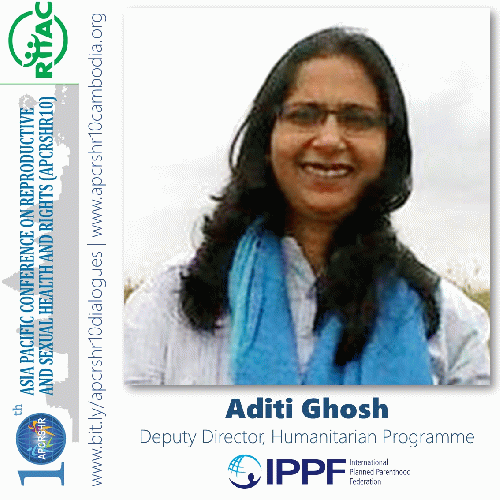
Aditi Ghosh is Deputy Director of Humanitarian Programme at International Planned Parenthood Federation
(Image by CNS (Citizen News Service citizen-news.org)) Details DMCA
The United Nations (UN) data estimates that 168 million people worldwide will need assistance in 2020 to deal with humanitarian crises, including natural disasters, extreme climate events, conflicts and infectious disease outbreaks. 25% of these will be women and girls of reproductive age. And they are the ones who are disproportionately affected during any humanitarian disaster - from being more likely to die from pregnancy and childbirth related complications, to facing increased risks of unintended pregnancies, unsafe abortions, sexually transmitted infections, as well as sexual and gender-based violence.
"60% of the preventable maternal deaths and 53% under five deaths take place in conflict and natural disaster settings, as life-saving family planning interventions are too often deprioritised in a crisis situation," said Aditi Ghosh, Deputy Director of Humanitarian Programme, at International Planned Parenthood Federation (IPPF), who was a keynote speaker at the 7th #APCRSHR10 Dialogues, co-hosted by the 10th Asia Pacific Conference on Reproductive and Sexual Health and Rights (APCRSHR10) and CNS.
Health services for women remain crucial even in a crisis
Aditi cites the real life example of Amelia, who was 7 months pregnant when an earthquake hit Indonesia's Sulawesi island in 2018. Amelia had to literally run for her life (during that advanced stage of pregnancy) to safer grounds where she gave early birth. This life threatening experience shattered her. She was desperate to get some contraceptive to prevent another pregnancy. This was a daunting task as all the family planning clinics had either been damaged or were closed, and she was living in a displacement camp high up on a hill. But luck was on her side. She was able to receive an injectable contraceptive from Indonesian Planned Parenthood Association (IPPA), which had launched a humanitarian response through mobile health clinics and had started providing family planning services, operating from tents located near the displacement camps. Over the course of this response, IPPA provided more than 15,000 contraceptives and reached out to more than 20,000 people. This is just one example of why sexual and reproductive health services are so important in a crisis situation.
And yet, too often these services are overlooked and underfunded in emergency situations. In any humanitarian crisis - food, water, and shelter take top priority, with very little focus on women's reproductive health needs. We seem to forget that 4% of any disaster affected population will be pregnant and 15% of them will experience pregnancy related complications. So women's sexual and reproductive health needs do not suddenly stop or diminish during an emergency - in fact they become greater! Family planning is one of the most lifesaving, and cost effective interventions for women and girls. However there remains an overwhelming gap in an emergency response due to lack of prioritization and funding. Consequently many women and girls are forced to contend with unmet needs for family planning, unplanned pregnancies, in addition to the trauma of conflicts, disaster and displacement, rues Aditi.
Double whammy of COVID-19 in disaster settings
As it is, Asia Pacific is a very disaster-prone region and faces a daunting spectrum of natural hazards. Lack of access to healthcare and social welfare services further exacerbate the situation. Infectious diseases, like coronavirus disease (COVID-19), are harder to control during humanitarian crises, especially in congested camp settings. With all human and financial resources directed towards managing COVID-19, it has been a double whammy for the women. Essential reproductive health services needed by them have got deprioritized. Due to the lockdown, many family planning clinics and outreach services have closed down, seriously affecting access to regular contraception and other sexual and reproductive health services.
A recent research paper by Guttmacher Institute paints a very grim picture. It estimates that even a modest decline of 10% in reproductive healthcare (use of short and long acting reversible contraceptives) due to COVID-19 would have disastrous implications for the lives of women and their new borns. It would result in an additional 49 million women with an unmet need for modern contraceptives, an additional 15 million more unintended pregnancies, 168,000 more new born deaths, 28,000 more maternal deaths and 3 million more unsafe abortions over the course of one year.
(Note: You can view every article as one long page if you sign up as an Advocate Member, or higher).





